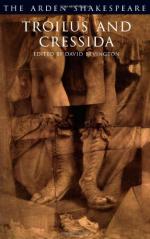|
This section contains 7,573 words (approx. 26 pages at 300 words per page) |

|
SOURCE: Spear, Gary. “Shakespeare's ‘Manly’ Parts: Masculinity and Effeminacy in Troilus and Cressida.” Shakespeare Quarterly 44, no. 4 (winter 1993): 409-22.
In the following essay, Spear examines the themes of masculinity and effeminacy in Troilus and Cressida in order to explore “the cultural fictions of male power.”
A pivotal moment from Shakespeare's Troilus and Cressida serves as my starting point for a discussion of the problematics of effeminacy in early modern culture. In Act 3, scene 3, after being taunted by Ulysses about Ajax's growing popularity and esteem, Achilles is in turn chastised by his male “varlet,” Patroclus, who chides him for being “an effeminate man / In time of action,” a deplorable, inverted condition as loathsome, says Patroclus, as its apparent corollary, “A woman impudent and mannish grown” (3.3.216-20).1 So compelling is the charge that Achilles can answer it only by recontextualizing this effeminacy as a source of strength and power, by claiming...
|
This section contains 7,573 words (approx. 26 pages at 300 words per page) |

|


